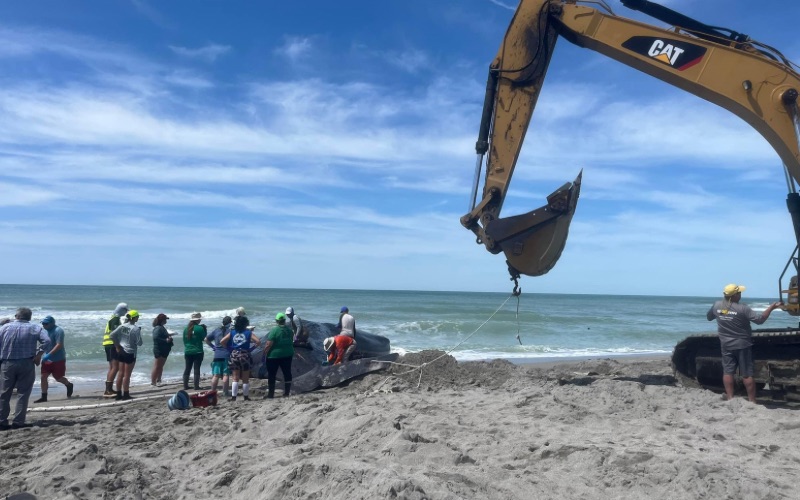
March 11, 2024
Once all stranding network partners arrived, it was determined that the harsh wave conditions and unpredictable animal behavior made it not safe for intervention. Moving large whales, weighing about 70,000 pounds, has serious safety risks for the whale and for responders involved.
The response effort consists of a multi-agency team of Stranding Network partners, including NOAA Fisheries Service, Mote Marine Laboratory, Florida Fish and Wildlife Conservation Commission, University of Florida, Clearwater Marine Aquarium, and Sarasota Dolphin Research Project.
Mote first received a call at about 8:30 a.m. this morning of the live, stranded animal. Large whales may strand alive for a number of reasons. Each case is different and the Southeast Region Marine Mammal Stranding Network responds to all large whale cases to better understand what factors may have contributed to the stranding.
Once all stranding network partners arrived at the scene, it was determined that the weather and harsh wave conditions were not yet safe for intervention. Moving large whales has serious safety risks for the whale and for the Network responders involved. As desperate as the Network partners are to intervene, it is not safe at this time. Additionally, towing live whales by the tail can result in seriously injuring or dislocating the tail, causing paralysis and is therefore considered inhumane.
At about 1:45 p.m., stranding network partners attempted to get closer by boat to humanely sedate the distressed animal; however, weather conditions were too severe.
At about 6 p.m., conditions didn’t improve and the Network suspended the recovery effort until the morning.
Venice Police Department remained stationed throughout the night and Strandings Network partners arrived back on scene at 7 a.m. Monday, March 11.
Throughout the night, it was confirmed the sperm whale had passed on its own.
At about noon on March 11, 2024, the whale was placed on the beach by a heavy excavater, which was necsarry to move such a large animal.
The Network will be performing a necropsy, animal autopsy, this morning. Samples will be collected to attempt to determine cause of illness and death and to better understand sperm whale health, energetics, and life history. Once the necropsy is complete, the whale will be towed offshore to be returned to sea.
Every animal, deceased or alive, matters. Rapid response to live stranded animals is not the only way the team works to contribute to the conservation of our local marine species. The information gathered during the necropsy helps to evaluate the long-term mortality trends of these species, especially as it relates to pathology or human-related activities. Such research data are crucial to species management and conservation, and data from necropsies conducted by Mote’s Stranding Investigations Program are provided to state and federal wildlife managers as part of databases of stranding network partners.
**Mote Marine Laboratory & Aquarium’s Stranding Investigation Program responds to calls of “stranded” (i.e., injured or deceased) sea turtles, dolphins and whales in Sarasota and Manatee county areas. To report a stranded animal to Mote’s 24/7 hotline call: 888-345-2335.

